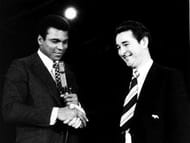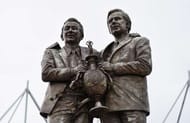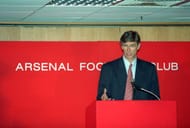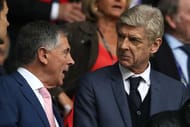January 6, 1975
There is nothing spectacular about the date when you first look at it. Nothing much to remember, no notable personalities were born, no wars were waged apart from the Cold War – which was just there, ever since the culmination of World War II until the collapse of the Soviet Union in 1991.
However, far from the scope of newspapers, away from the shutterbugs, on the banks of River Trent in England, a rather inconspicuous appointment was made at Nottingham Forest. Now this was a club which, in over 90 years of existence, had only ever won the Football Alliance* once and the FA Cup twice, while being relegated on a couple of occasions from the top-tier and also the second one.
The East Midlands outfit, who were at that time 13th in the second division, appointed a 39-year-old conceited and overweening manager, who had been sacked only 44 days into his previous job, having won only one of the six games that he had presided over. The former Middlesbrough striker took over from Allan Brown, who was shown the door by the club after their Boxing Day 2-0 defeat at the hands of city rivals Notts County.
Enter Brian Clough.
The Englishman had previously lifted the English top-division title with Forest’s fierce rivals Derby County and was not new to the tricks of the trade. Clough was outspoken, charismatic, controversial and what not but above all, he was one hell of a manager.
He failed miserably at Leeds United as he tried to reinvent the club and their ‘dirty’ playing style. He was shown the door for shunning some of the superstars of the then league champions, but he didn’t change his ways; he didn’t change just for the sake of it, for saving his job. That just wasn’t who he was.
In addition to that, there was another crucial factor missing during Clough’s time at Elland Road – he didn’t have his long-time friend, advisor, confidante and assistant in Peter Taylor, who had decided to part ways with his friend following Clough’s decision to take over from Don Revie at the helm of The Whites. Taylor, instead, opted to succeed his former friend at the helm of Brighton and Hove Albion.
When Clough joined Forest he was without Taylor and the club finished the season at the 8th position in the second division. It was not until July of that year that the two were finally reunited. But they didn’t find success at first and had to wait until the second season to earn promotion to the top-flight.
In their first season in the top-flight, Forest did something they had never even dreamt of – they won their first-ever League Cup by defeating Bob Paisley’s Liverpool 1-0 in the replay of the final. They then topped this achievement by winning their maiden and only English top-division title, finishing 7 points clear of second-placed Liverpool.
It was Forest’s first triumph in the domestic league in 113 years of existence and remains their only title in the 39 years since.
“The River Trent is lovely, I know because I have walked on it for 18 years.” ~ Brian Clough
Forest won the title in their very first season in the top-flight after getting promoted, a feat unheard of back then. To put things into perspective, they did a Leicester, way before anyone in East Midlands had ever dreamt of lifting the title.
They did come close to repeating their feat the very next year but fell short as Liverpool reclaimed what they felt was rightfully theirs, winning the league comprehensively. The season, however, saw unprecedented success for the Forest faithful as they went on to retain the League Cup, although that was not the reason why it was special.
The Tricky Trees, as they are fondly called by their fans, lifted their first-ever European Cup by beating Malmo in the final at the Olympiastadion in Munich. The victory was even sweeter for Clough and his men as they knocked out defending champions and by then, arch-rivals Liverpool along the way. There was a rivalry brewing between Clough and Paisley, one which ultimately good for English football – the two rivals won five consecutive European Cups between them.
Next season, once again, Forest won the European Cup by defeating Hamburger SV in the final. And although they did get to the final of the League Cup, they were bested by Wolves on the night.
Clough had done the impossible, and his feat can be summed in no better words that the ones used by Daniel Taylor of the Guardian who wrote:
“To put the [Forest] story into perspective, perhaps the best place to start is to imagine Huddersfield Town, 13th in the Championship last season, winning promotion next May, then the Premier League at the first attempt, back-to-back Champions Leagues, a couple of Capital One Cups and creating a record for going unbeaten in the top division – 42 matches in Forest’s case – that would last a quarter of a century.
Forest were that team: 13th in the old Division Two when Clough landed his coat on the peg for the first time, on 6 January 1975. They did all the above within five years, as well as knocking Liverpool, the double European Cup winners, off their perch, long before Sir Alex Ferguson coined the phrase.”
Clough was at the top of his game, he had just done what nobody in the world of football had imagined, but it was all about to fall apart.
“I wouldn't say I was the best manager in the business. But I was in the top one.” ~ Brian Clough
The next two seasons Forest struggled but it was not until Taylor’s departure in 1982 that things went from bad to worse. Clough had lost his assistant, his confidante and his advisor but above all, he had lost his friend and it was something that would have huge repercussions on the man – who had claimed to have walked on River Trent for 18 years – and the club which allowed him to do it. Their friendship came to an unceremonious end but it had already left a lasting impression on at least two clubs and millions of fans.
It took Forest and Clough nine years to win their next trophy, when the East Midlands outfit beat Luton Town in the final of League Cup to end the drought. They won the League Cup the following year too, defeating Oldham Athletic in the final, and that remains as the Reds’ last triumph in any competition that is still in existence.
They did win the Full Members Cup in 1991/92 but as I said above, the competition is no longer in existence. Sadly, during the entirety of his tenure as manager of various clubs, the FA Cup eluded Clough.
The inaugural Premier League season – 1992/93 – was Clough’s last as the manager of Nottingham Forest, and it ended in the worst possible way, far worse than anyone would have imagined. The legendary manager’s 18-year-long reign at the club culminated with Forest being relegated to Division One.
Clough had done more for Nottingham Forest than anyone before or after him, but he also left the club in a position from which they have still not recovered. His last season saw them relegated from the top-flight, and they have never come back and achieved a sustained run in the Premier League.
Clough was never one to let go, and it was probably this obsession of his which cost Nottingham Forest so dearly. But I doubt Forest would complain, for they are still the 3rd most successful English team in the European Cup (now Champions League), behind only Liverpool and Manchester United.
“Resignations are for prime ministers and those caught with their trousers down, not for me.” ~ Brian Clough
September 22, 1996
21 years, 9 months and 16 days after the appointment of Clough at Forest, another English club made a rather unspectacular appointment which ultimately helped the club reach hitherto untouched heights. The club was Arsenal and the manager was Arsene Wenger.
Wenger was a name unheard of on English shores. He had managed previously in Europe with some success, but had spent his last two years in Japan with Nagoya Grampus Eight. The Frenchman was an underwhelming appointment considering that the Gunners were favourites to land legendary manager Johan Cruyff.
Wenger’s record up until his appointment as the manager of Arsenal wasn’t exemplary either. He had managed Nancy for three seasons with a limited transfer budget and in his final season the French outfit were relegated, having finished 19th on the table.
After that, he was appointed at the helm of AS Monaco. Although he did win Ligue 1 in his first season at the club, he was sacked seven seasons later with the team languishing in 17th position during the first two months of the campaign. A UEFA Champions League semi-final loss to AC Milan, coupled with a few losses in Cup finals and a solitary Coupe de France title – along with the league title that he had won in 1987/88 – was all that Wenger had to show for during his 10 seasons in Europe.
However, what Wenger did in the next 10 seasons was something even his staunchest supporters had not dreamt of and something that not even his biggest detractors can take away. He revolutionized English football by implementing diets in the daily routine of the players, which helped them improve their fitness and stamina.
Wenger missed out on European qualification during his first season, having finished third, but made up for that by becoming the first foreign manager to win the domestic double – when he won the league and the FA Cup in his first full season in charge of the club. And he did that while playing an expansive and hugely appealing brand of football, so much so that it inspired a few words of wisdom from the legendary Brian Clough.
“Arsenal caress a football the way I dreamed of caressing Marilyn Monroe.” ~ Brian Clough
After drawing blanks in the next couple of seasons, which included narrow misses, crunch losses and the departure of key personnel, Wenger once again won the double in 2001/02, a victory which was made all the sweeter by the manner in which it was done.
Arsenal secured a 2-0 win over Chelsea in the final of the FA Cup and followed it with a decisive victory over Manchester United at Old Trafford in the penultimate game of the season to secure the title at the home of their biggest rivals.
It was following this memorable season that Wenger quipped: "Nobody will finish above us in the league. It wouldn't surprise me if we were to go unbeaten for the whole of the season."
Arsenal broke Manchester United’s Premier League record by going 29 matches without tasting defeat and even overhauled Nottingham Forest’s record of 22 away games without a loss. However, the Red Devils had the last laugh as they capitalised on Arsenal’s poor form towards the end of the season, which saw the Gunners blow away an 8-point lead and cede the league title to the Old Trafford outfit.
The Gunners did retain the FA Cup following a 1-0 win over Southampton in the final that year.
“If you do not believe you can do it then you have no chance at all.” ~ Arsene Wenger
What Arsene Wenger’s Arsenal did next is a story that will long live in the memories of the Gunners’ faithful and will be passed on through generations. A story of grit, determination and above all a desire to be immortalised – one which helped them etch their names in English football folklore.
One season after claiming that his side can go the entire season unbeaten, his side did the unfathomable by actually winning the league without losing a single game. At the end of the season, Arsenal's league record read: Won 26, Drawn 12, Lost none.
The team became the first since Preston North End – 115 years ago – to go the entire campaign unbeaten, and the first one to do so in the 38-game format. Wenger’s Arsenal continued their unbeaten run to 49 games before it came to a screeching, untimely and undeserving halt at the hands of Manchester United.
The Gunners finished the following season in second place behind Chelsea – who had become a force to reckon with following the investments of Russian billionaire Roman Abramovich. They won the FA Cup by beating Manchester United in the final, but that was the last trophy they would win for the next nine years.
The North London outfit did reach the final of the UEFA Champions League in the 2006/07 season – the first time in their history – but lost 2-1 to Barcelona on the night. The Champions League is one trophy that Wenger has always desired but one that has eluded him till date.
Wenger’s hands were tied due to the club shifting base from Highbury to the new uber cool, sophisticated and multi-million pound Ashburton Grove, and this forced him to operate with limited resources in the transfer market while also allowing his best players to leave. All of this contributed to Wenger’s and Arsenal’s failures over the coming years.
However, what hurt them the most was the departure of long-term board member and vice-chairman David Dein in 2007. The Englishman had played a decisive role in getting Wenger to Arsenal when the Frenchman was a relatively unknown entity in England. He had helped Wenger settle into his job as the manager of the club and had backed him through thick and thin.
Dein was more than just a board member for Wenger; he was his friend, his advisor and his enabler. Wenger is known to be a fickle minded person and it was Dein who helped push a deal for a player over the line when the Frenchman himself dithered.
Since Dein’s departure, Wenger hasn’t been the same ruthless manager that had conquered England and had challenged the unquestionable supremacy of Sir Alex Ferguson.
Wenger did end his 9-year-long barren run with an FA Cup final win over Hull City in 2013/14. He has since won the Cup on two more occasions to become the most successful manager in the history of the oldest cup competition in the world, having won it on seven occasions.
But Arsenal have failed to hit the heights that they did during the first decade of Wenger’s reign. And today, it can be safely said that the Gunners have hit a new nadir under Wenger. They have finished outside the top 4 for the first time in his reign, they have failed to qualify for the Champions League after 19 consecutive seasons in it and above all, they have finished below fierce local rivals Tottenham Hotspur.
Wenger had many opportunities during his 20-year reign to bow out as the most successful manager in the history of the club. He could, and some would say should, have done that, but he continued due to his self-professed love for the ‘club of his life’. It is his obsession to win the Champions League while playing the beautiful football that his teams are known for, which has kept him going. That hasn’t come to fruition in 20 years and doesn’t look like it will any time soon.
However, today he faces the most important board meeting of at least the last decade, one where his future will be decided, and with that the future of Arsenal football club.
It was Brian Clough’s obsession that hurt Nottingham Forest in ways that they still haven’t recovered from. It was his obsession that relegated them, from where they have never come back again for a sustained run.
Is Wenger on the verge of pulling a Brian Clough?
Wenger has been called arrogant, a disgrace, and what not. But the truth seems to be that he is not meant to win the Champions League. And sometimes, the noblest thing to do is to acknowledge – not your shortcomings, but your fate.
Wenger will never win the Champions League, just like Lionel Messi will never win the World Cup. That doesn’t mean Pele or Maradona or Alvaro Arbeloa are better footballers than Messi, it just means they are more accomplished. Things worked out for them, while they didn’t for the diminutive Argentine.
And nor have they worked out for the lanky Frenchman.
Achieving the impossible is what has driven great men since the beginning of time, while it is obsession that has led to their downfall. Today, Wenger stands at a juncture that is similar to that of Clough, and he should not let his obsession get the better of him. He should do not what he thinks is best for the ‘club of his life’, but what is actually good for the club.
Whether he agrees to stay or decides to leave is up to him. After all, ‘Arsene Knows’.
I would like to conclude with one of Wenger’s best quotes of all time, in the hope that it would remind him of the essence of what he said.
“A football team is like a beautiful woman. When you do not tell her, she forgets she is beautiful.” ~ Arsene Wenger
Nottingham Forest’s Arsenal connection
Forest had altruistic roots, as their donation of a set of red football kits to a group of men in 1886 led to the foundation of The Arsenal Football Club, a club which rewrote English record books on many occasions. The two clubs have always been intertwined; Arsenal, till date, wear the red, albeit with white, as their staple jerseys for home games.
Not only that, it was Brian Clough’s Nottingham Forest who went 42 league games unbeaten – the equivalent of a league season – between 26 November 1977 and 9 December 1978, an English top-flight record. That was broken by who else but the Gunners, who went an entire season unbeaten and then some under Arsene Wenger, with the 49 match unbeaten run of the Invincibles lasting from 7 May 2003 until 24 October 2004.
*Football Alliance was a rebel football league established in 1889 considering of 12 clubs to rival the Football League. It was merged with the Football League in 1892.




